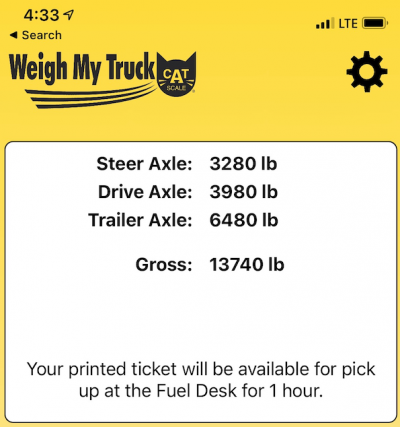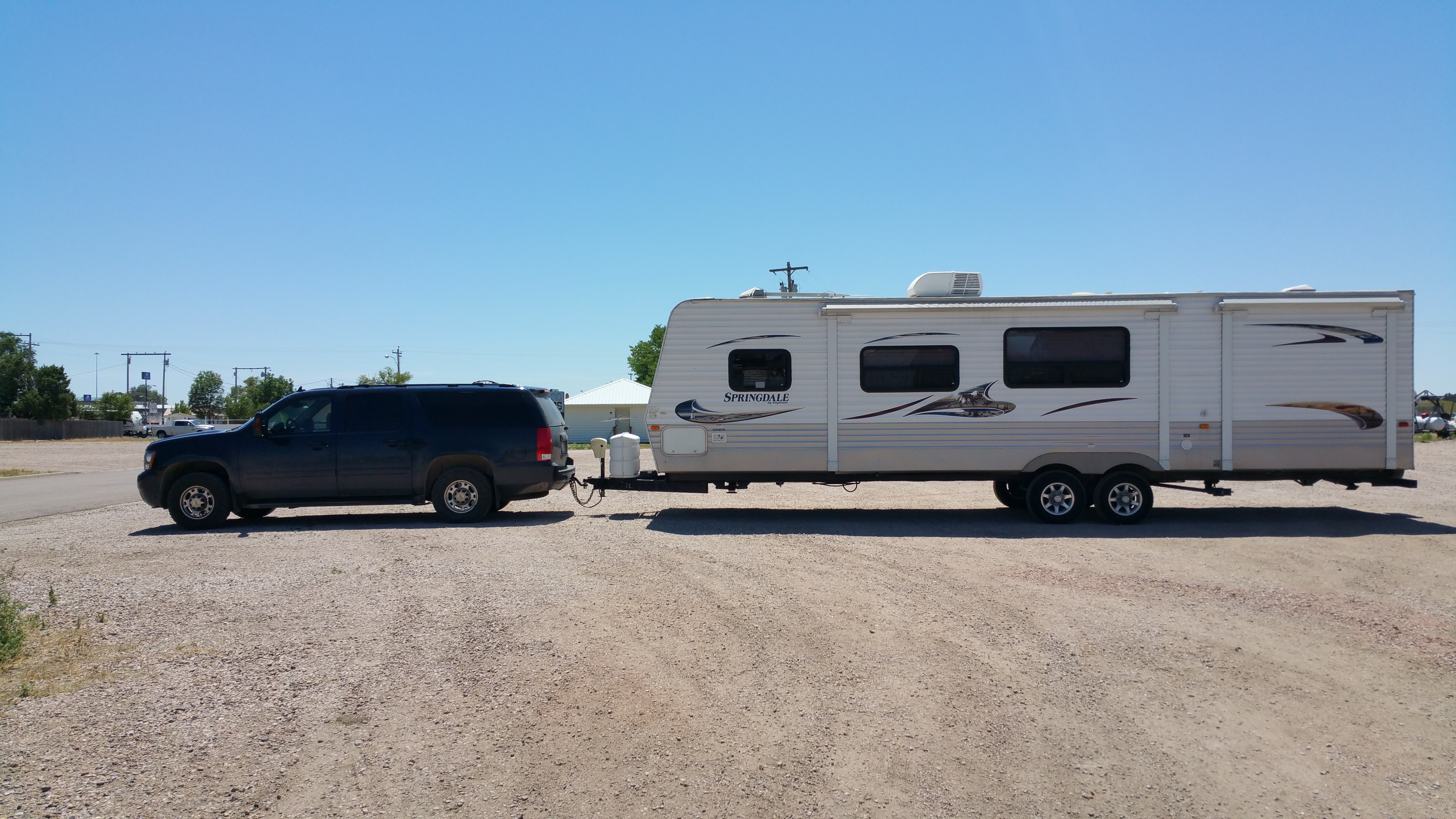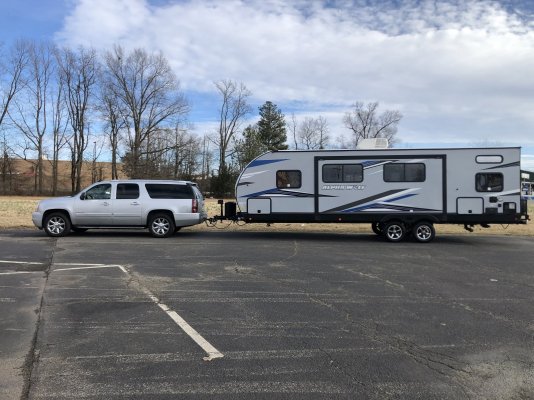I have a 2014 Tahoe with the tow package. It has 157k miles on it. I just installed new Gabriel HD shocks (coil overs) on the rear. I purchased a Keystone trailer with a dry weight of 5400 lbs thinking the Tahoe could easily handle towing it because the book says max tow capacity is 8200 lbs. I have the proper sway bars and hitch set up, but it still gets uncomfortable (sway) at 45-50 mph. New tires are on the trailer. The hitch drops approx 2.5 inches when hooked up, so I believe I have enough tongue weight. The sway bars are tight. They pull the hitch up approx 1.5 inch. The drop without the sway bars is 4 inches. The drop with the is 2.5 inches. I'm not sure what to try next.
You are using an out of date browser. It may not display this or other websites correctly.
You should upgrade or use an alternative browser.
You should upgrade or use an alternative browser.
Towing stability
- Thread starter 85Keydet
- Start date
Disclaimer: Links on this page pointing to Amazon, eBay and other sites may include affiliate code. If you click them and make a purchase, we may earn a small commission.
petethepug
Michael
If you have the Max trailering package w/ the integrated trailer brake controller and coil over are installed in back (not sure of fronts yet) part of your stability system was disabled if the z55 struts were removed. No z55, no worry then.
* Do you have 2 or 4WD?
* If you have/had z55 are they bypassed or still up front?
* Truck have a lift kit?
* OE tires and rims?
* Do you have 2 or 4WD?
* If you have/had z55 are they bypassed or still up front?
* Truck have a lift kit?
* OE tires and rims?
In addition to Michael's good questions, I'll add that I tow a 7500 lb camper with our 2012 Yukon XL Denali and after doing so for several years, I observe:I have a 2014 Tahoe with the tow package. It has 157k miles on it. I just installed new Gabriel HD shocks (coil overs) on the rear. I purchased a Keystone trailer with a dry weight of 5400 lbs thinking the Tahoe could easily handle towing it because the book says max tow capacity is 8200 lbs. I have the proper sway bars and hitch set up, but it still gets uncomfortable (sway) at 45-50 mph. New tires are on the trailer. The hitch drops approx 2.5 inches when hooked up, so I believe I have enough tongue weight. The sway bars are tight. They pull the hitch up approx 1.5 inch. The drop without the sway bars is 4 inches. The drop with the is 2.5 inches. I'm not sure what to try next.
1/ People have widely varying perceptions and tolerances for trailer sway. On a windy day, you'll feel it behind you, and you'll feel the suck of a truck passing you on the highway. But if everything is set up right, it will be momentary and is easily controllable. This really bothers some people, but it no longer bothers me because it's easily controllable with my setup.
2/ You need a hitch with excellent sway control. I use a Recurve R3 which has integrated friction-based sway control that's highly effective.
3/ The shorter the wheelbase, the more pronounced the sway will feel.
All of this said, there are lots of people on here pulling similar weight trailers with shorty Tahoes/Yukons.
Which hitch are you using?
Dry weight of campers doesn't really mean anything. On most campers it doesn't even account for batteries, propane tanks, awning(s), etc. I really wish I would have stopped at a scale the day we picked up ours a few years. I've read of some campers being 400-800lbs over on listed dry weight when new.
The best way to dial in your weight distribution hitch is by going to a scale with the camper loaded up as if you were ready for a trip. Measurements don't really do much since there's no way to know if you're actually in the 10-15% tongue weight most bumper pulls should be.
What is the total length of the camper?
The best way to dial in your weight distribution hitch is by going to a scale with the camper loaded up as if you were ready for a trip. Measurements don't really do much since there's no way to know if you're actually in the 10-15% tongue weight most bumper pulls should be.
What is the total length of the camper?
+1. Excellent advice. Most truck stops have a CAT scale. Here's ours, loaded up for camping but with empty water and holding tanks.Dry weight of campers doesn't really mean anything. On most campers it doesn't even account for batteries, propane tanks, awning(s), etc. I really wish I would have stopped at a scale the day we picked up ours a few years. I've read of some campers being 400-800lbs over on listed dry weight when new.
The best way to dial in your weight distribution hitch is by going to a scale with the camper loaded up as if you were ready for a trip. Measurements don't really do much since there's no way to know if you're actually in the 10-15% tongue weight most bumper pulls should be.
What is the total length of the camper?

intheburbs
Full Access Member
Wheelbase of the tow vehicle has a surprisingly-large effect on sway and stability. Personally, I've always had doubts about a short-wheelbase Tahoe or Yukon pulling an 8,000-lb behemoth safely.
What kind of hitch/weight distribution system are you running?
You seem to be mixing your terminology. You write about adjusting "sway bars" and how that changes hitch height and drop.
Weight distribution bars are designed to create a truss to push weight off the hitch and rear axle, and distribute it back to the front axle and trailer axles. If the WD bars are properly set up, there shouldn't be any drop because both the front and rear axle are being compressed by the extra weight in the same ratio. In other words both the rear and front should drop the same amount.
If it's a standard weight distribution system, using chains at the end of the weight bars, these are NOT "sway bars." They're doing nothing to prevent sway. You need a separate sway control device, usually a friction sway brake, that attaches at two different points on your setup. This is usually a smaller ball to the side of the main ball, and a similar-sized small ball on the side of the trailer frame.
But for a really short wheelbase vehicle, I'd strongly recommend one of the sway-elimination hitches like the Hensley or Pro Pride. These hitches do exactly what they promise - they eliminate sway by physically locking the trailer to the tow vehicle. They're not cheap, but the added safety factor is worth it.
More tongue weight also increases stability. However, with SUVs, it's very easy to overload that rear axle, so you have maintain that balancing act. In one of my early rigs, pulling a 26' trailer with my 2001 half-ton, I had the sway brake cranked so tight that I actually bent the 3/4" steel mounting plat that the sway ball was attached to.
What kind of hitch/weight distribution system are you running?
You seem to be mixing your terminology. You write about adjusting "sway bars" and how that changes hitch height and drop.
Weight distribution bars are designed to create a truss to push weight off the hitch and rear axle, and distribute it back to the front axle and trailer axles. If the WD bars are properly set up, there shouldn't be any drop because both the front and rear axle are being compressed by the extra weight in the same ratio. In other words both the rear and front should drop the same amount.
If it's a standard weight distribution system, using chains at the end of the weight bars, these are NOT "sway bars." They're doing nothing to prevent sway. You need a separate sway control device, usually a friction sway brake, that attaches at two different points on your setup. This is usually a smaller ball to the side of the main ball, and a similar-sized small ball on the side of the trailer frame.
But for a really short wheelbase vehicle, I'd strongly recommend one of the sway-elimination hitches like the Hensley or Pro Pride. These hitches do exactly what they promise - they eliminate sway by physically locking the trailer to the tow vehicle. They're not cheap, but the added safety factor is worth it.
More tongue weight also increases stability. However, with SUVs, it's very easy to overload that rear axle, so you have maintain that balancing act. In one of my early rigs, pulling a 26' trailer with my 2001 half-ton, I had the sway brake cranked so tight that I actually bent the 3/4" steel mounting plat that the sway ball was attached to.
Coolman1987us
Full Access Member
Tongue weight should be 10% of trailer weight, including load. "Drops 2 inches" means nothing and is not a good way to judge. Cargo position/weight distribution is key.
tagexpcom
Full Access Member
- Joined
- Aug 12, 2023
- Posts
- 126
- Reaction score
- 106
I tow a 5300lb dual-axle cargo trailer -> camper with a Blue Ox TrackPro https://www.amazon.com/Blue-Ox-BXW0850-TrackPro-Distribution/dp/B08CCM3TFP WDH behind my 2021 Yukon Denali w/6.2L, magnetic ride only (no air). The trailer has 650lb tongue weight.
Here's my thread on my towing https://www.tahoeyukonforum.com/thr...lb-trailer-with-and-without-stablizer.143763/ The conclusion was that even with proper tongue weight, my front/back (instead of middle) loading was not the best and thus WDH absolutely required.
With the WDH it's rock solid up to 75mph (fastest I've gone) and one can tell the vehicle (with 7500lb max towing) is a good match at 5300lbs and pulls smoothly.
In my opinion, you're vehicle should be capable of pulling you're trailer once you get the ducks in a row
Here's my thread on my towing https://www.tahoeyukonforum.com/thr...lb-trailer-with-and-without-stablizer.143763/ The conclusion was that even with proper tongue weight, my front/back (instead of middle) loading was not the best and thus WDH absolutely required.
With the WDH it's rock solid up to 75mph (fastest I've gone) and one can tell the vehicle (with 7500lb max towing) is a good match at 5300lbs and pulls smoothly.
In my opinion, you're vehicle should be capable of pulling you're trailer once you get the ducks in a row
Last edited:
intheburbs
Full Access Member
Tongue weight should be 10% of trailer weight, including load. "Drops 2 inches" means nothing and is not a good way to judge. Cargo position/weight distribution is key.
13% is actually ideal. More tongue weight is more stable.
Here's the money shot that melts brains, especially on the RV fora....8600-lb trailer, 1120 tongue weight, no WD, no sway control, no white knuckles, 20,000 miles towed including Rocky Mountain elevations to 11,000 feet:

Similar threads
- Replies
- 16
- Views
- 2K
- Replies
- 7
- Views
- 803

